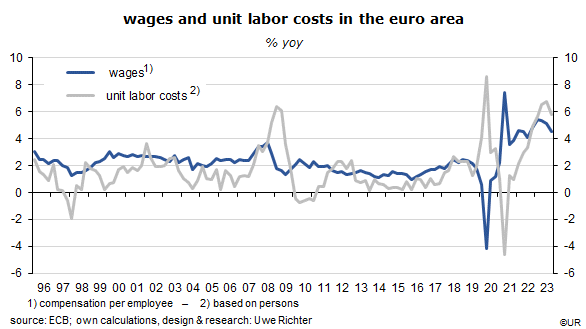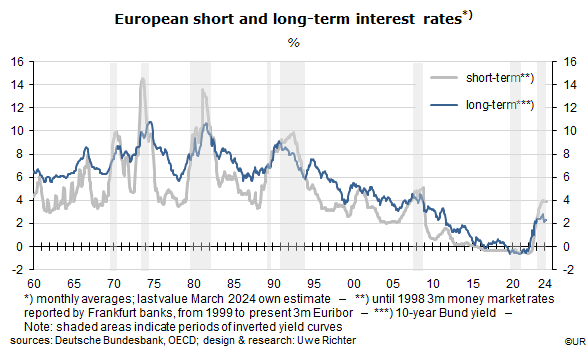Christine Lagarde has more or less announced last Thursday that European policy rates will be cut at the June 6 meeting of the Governing Council. It would be the turning point in this cycle and probably means 25-basis point reductions of both the deposit and main refinancing rates. They have been at highs of 4.0 and 4.5% since last summer. Inflation has come down more than expected while economic growth continues to disappoint. Since real GDP is presently only 3.0% higher than in the pre-Corona fourth quarter of 2019, the output gap is so large by now that firms are unable to raise output prices as much as they would like. The ECB estimates that consumer price inflation rates – which have fallen from a peak of 10.6% y/y in the autumn of 2022 to 2.6% last month – will come down further and gradually approach the 2% target. With the equilibrium refinancing rate in the order of 2.5% (2% target inflation plus 0.5% productivity growth), it is thus likely that policy rates will fall by altogether about 200 basis points, perhaps by 25 per quarter. Should weak growth persist, and robust labor markets finally come to an end, the cuts could be even larger.
The main uncertainty is labor costs. Goods prices may continue to fall, if not as rapidly as in 2023, but wages and unit labor costs remain in the order of 4 ½ and 6% y/y as workers have some success in their attempt to make up for the recent loss of purchasing power. Benign labor market conditions have strengthened their position in wage negotiations. In other words, the main domestic source of inflation could yet interrupt the overall disinflation process.

Will it? Data on this front come with a large time lag, they are quarterly, not monthly, and not all are seasonally adjusted. The ECB is uncertain about the exact dynamics in labor markets at this point and therefore prefers to wait until first quarter 2024 numbers are in. But going by the German index of labor costs – which was only +2.5% y/y in Q4 – there is no need to worry too much about this cost factor. The June rate cuts are a near-certainty. For financial investors, it makes therefore sense to borrow at floating (money market) rates and to buy long-duration assets.
The present yield of 2.3% for 10-year German government bonds, the euro area benchmark, may seem low, but it has been around zero percent for no less than seven years before (2016 to 2022). If markets move in this direction again, ie down by about 200 basis points, large capital gains can be expected. Borrowing at fixed long-term rates, for example for the purchase of real estate, will probably turn out to be premature.

Going forward, the main question is whether we are presently near a new “normal” of 2 to 2 ½% for long-term triple A bonds in Europe or whether this has just been an outlier, an interruption in a secular disinflationary process. The world economy continues to expand briskly, at rates of about 3%, while the international division of labor continues to intensify, no matter that this is the opposite of what we hear from the media. Emerging economies keep combining low labor costs and modern technology, driving productivity growth. In purchasing power terms, they already account for the biggest share in global GDP. From a European perspective, export and import prices will therefore remain on a down trend and keep overall inflation in check, including wages.
Add to this low capacity utilization rates in advanced economies and the answer to the above question is: no, there will be no new wage-inflation spiral in Europe, nor globally. Corona and the oil and gas price explosions were probably one-time events. Under the (admittedly heroic) assumption that there won’t be shocks like these in the future, I am sure that very low inflation will soon return to Europe. An important contributing factor could be a big decline of stock markets which have reached frothy valuations, especially in the US. Combined with profit taking, a deleveraging of positions and subsequent banking crises, deflation fighting could be back on the monetary policy agenda. Japan after 1989 all over again, but on a global scale, and government bonds as the ultimate safe haven? I am aware that there are usually many more predictions of such disasters than the number of actual disasters. In any case, it would not hurt to be prepared and to make contingency plans.
###
About Wermuth Asset Management
Wermuth Asset Management (WAM) is a Family Office which also acts as a BAFIN-regulated investment consultant.
The company specializes in climate impact investments across all asset classes, with a focus on EU “exponential organizations” as defined by Singularity University, i.e., companies which solve a major problem of humanity profitably and can grow exponentially. Through private equity, listed assets, infrastructure and real assets, the company invests through its own funds and third-party funds. WAM adheres to the UN Principles of Responsible Investing (UNPRI) and UN Compact and is a member of the Institutional Investor Group on Climate Change (IIGCC), the Global Impact Investing Network (GIIN) and the Divest-Invest Movement.
Jochen Wermuth founded WAM in 1999. He is a German climate impact investor who served on the steering committee of “Europeans for Divest Invest”. As of June 2017, he is also a member of the investment strategy committee for the EUR 24 billion German Sovereign Wealth Fund (KENFO).
Legal Disclaimer
The information contained in this document is for informational purposes only and does not constitute investment advice. The opinions and valuations contained in this document are subject to change and reflect the viewpoint of Wermuth Asset Management in the current economic environment. No liability is assumed for the accuracy and completeness of the information. Past performance is not a reliable indication of current or future developments. The financial instruments mentioned are for illustrative purposes only and should not be construed as a direct offer or investment recommendation or advice. The securities listed have been selected from the universe of securities covered by the portfolio managers to assist the reader in better understanding the issues presented and do not necessarily form part of any portfolio or constitute recommendations by the portfolio managers. There is no guarantee that forecasts will occur.
Read the full article in PDF format here: English.
